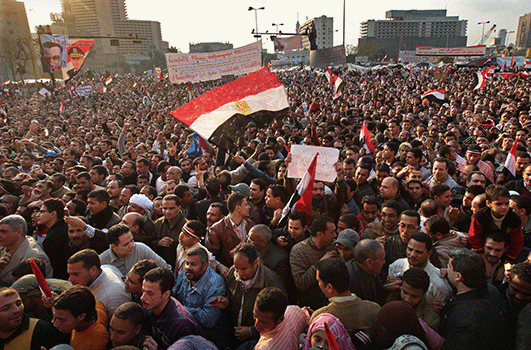Egyptian President Defies Military
July 10, 2012
Egyptian President Mohamed Morsi briefly reconvened parliament today in defiance of that country’s supreme court and powerful ruling military council. Morsi’s action intensified the power struggle between the military and the Muslim Brotherhood, an Islamist political movement that dominates Egypt’s first freely elected civilian government. Islamists advocate Islamic political rule, which usually involves the imposition of Shari`ah law, the moral and legal code of Islam. During the parliamentary session, members approved a proposal to seek legal advice on an order by the Supreme Council of the Armed Forces (SCAF) in June to dissolve parliament. That order followed a decision by the supreme court that parliamentary elections held in 2011 had been unconstitutional.
The SCAF has ruled Egypt since the 2011 revolution that ended the 30-year rule of President Hosni Mubarak. In parliamentary elections held in late 2011, the Freedom and Justice Party (FJP), the political arm of the Brotherhood, won the largest number of seats. On June 24, Morsi, the FJP’s candidate, was declared the winner in presidential elections. Two days before the June 17 presidential election, however, Egypt’s supreme court–stacked with Mubarak-era members–ruled that the parliamentary elections had been unconstitutional. The decision effectively handed over all legislative power to the SCAF. Then, just as the presidential election polls were closing on June 17, the SCAF issued a declaration granting itself sweeping new powers. While the council declared that it would turn over power to the newly elected president, it stripped the office of any authority over the army. It also gave itself control over the budget and the members of a group writing a new, permanent constitution.

Hundreds of thousands of Egyptians protest against the government of President Hosni Mubarak in January 2011. The sometimes violent demonstrations led to Mubarak’s resignation in February. (© John Moore, Getty Images)
On July 8, President Morsi called on parliament to reconvene. The next day, the supreme court rejected that decree, insisting that its earlier ruling on the unconstitutionality of the parliamentary elections was binding. President Morsi, in turn, insisted that the parliamentary session had not violated the court’s decision. In a statement, FJP officials said parliament had acted only to approve a request by the speaker asking for suggestions about how to “implement the court’s decision.”
Additional World Book articles:
- Egypt 2011 (a Back in Time article)
- The Middle East: From Fall to Spring (a special report)


